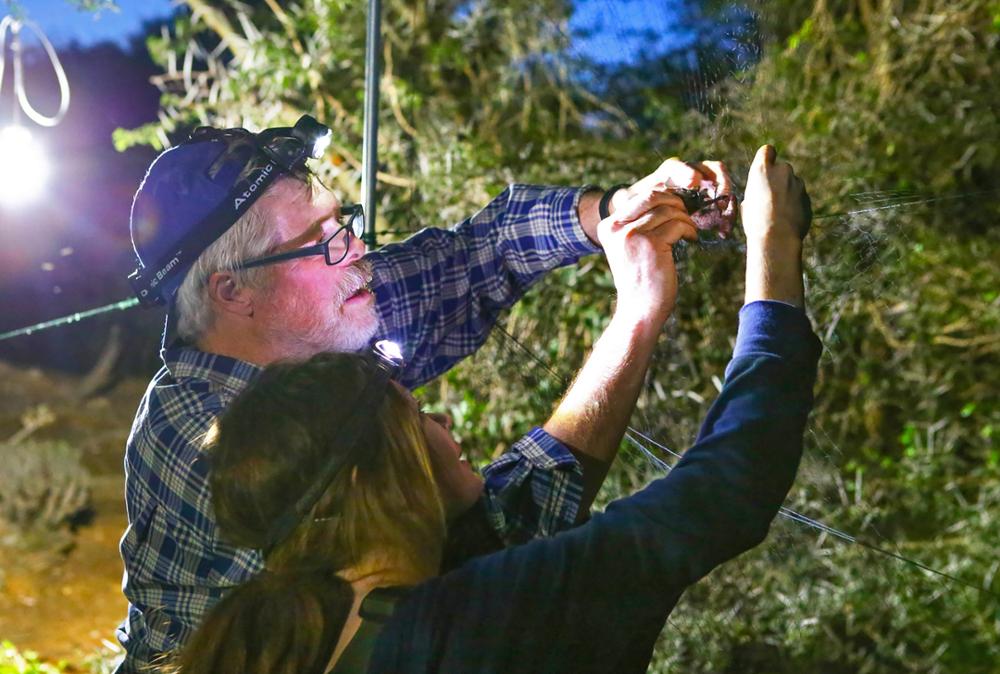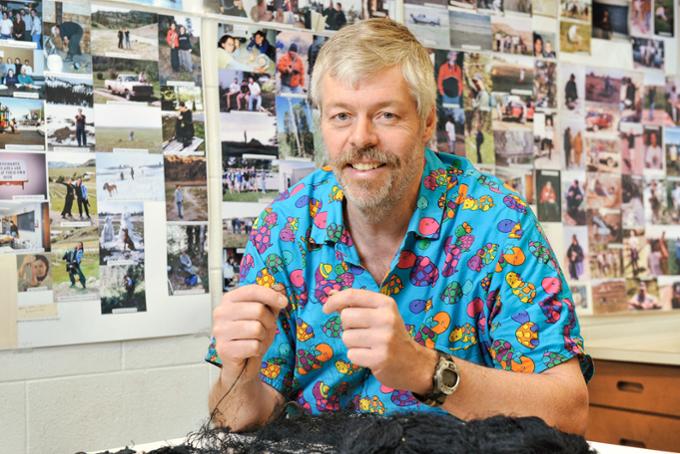A good mentor knows how to guide a student through an incredible journey of theory, facts, and experiences. An outstanding mentor knows all that AND how to help a student feel heard, understood, and valued.
Cue Dr. Mark Brigham, a beloved Biology professor in the Faculty of Science, who was recently awarded the 2022 Dr. Suning Wang Award for Outstanding Graduate Mentorship by the Canadian Association for Graduate Studies.
“Mark has a literal line up of graduate students wishing to join his research group at all times. Based on his success as a scientist, students from all over the world seek the opportunity to train with him. This has resulted in him supervising more graduate students than any other faculty member in the biology department at the University of Regina," says U of R biology professor Dr. Chris Somers, who has known Brigham for 18 years – as a colleague, research collaborator, and as a post-doctoral fellow under Brigham’s supervision.
"It has also," Somers continued, "resulted in requests for co-supervision of students from other universities in Canada, as well as some overseas, such as South Africa. Mark is a true asset to the University of Regina in terms of a national and international profile for research and graduate studies.”
Mark has a literal line up of graduate students wishing to join his research group at all times. Based on his success as a scientist, students from all over the world seek the opportunity to train with him.
Dr. Chris Somers, biology professor, Faculty of Science
Just what makes a great graduate-student supervisor?
To find out, just ask grad students who have had the opportunity to work with Brigham.
They will tell you his collegial style of supervising them, his mentorship, and his support have had positive effects on their personal, academic, and professional lives. Not to mention that throughout his tenure at the University of Regina, Brigham and his students have made, and continue to make, important contributions to science.
Now his track record of consistently providing his grad students with excellent supervision has been officially recognized with the outstanding graduate mentorship award.
Dr. Aziz Douai, the University of Regina’s dean of the faculty of graduate studies and research, put Brigham’s name forward for the award.
“Mark continues to have a sincere and tremendous impact on the lives and careers of his graduate trainees which makes him a remarkably deserving candidate,” says Douai.
“He is a true asset to the University of Regina in terms of a national and international profile for research and graduate studies.”

Dr. Mark Brigham helping a student take a bat out of a mist net in South Africa. Photo by Anne Brigham
Brigham has supervised students for more than thirty years, consistently offering outstanding academic guidance and mentorship. He actively teaches students the importance of scientific literature and encourages them to be part of professional societies. He partners new students with more experienced ones, both in the lab and in the field – and even connects people after they finish their degrees, in their professional and academic lives. These are but a few examples of his intentional and thoughtful approach to supervising graduate students.
Preparing good scientists and good human beings
A recurring theme in the letters of support for Brigham’s award, is his ability to demonstrate compassion, collegiality, generosity, patience, and team work – and he encourages his students to do the same. It’s clear that besides training and graduating successful biologists, he is also committed to preparing good scientists and good human beings. So it’s not surprising that his students report feeling part of a team and family when they work with him. His students even have a name for themselves: the “Brighamites.”
Students say their time in Brigham’s lab is one of personal and professional growth, where making mistakes is an acceptable part of their journey. For instance, he established the “Oops award” where students comfortably share mistakes which are acknowledged, and collectively learned from, in a collegial atmosphere.
In the words of Matina Kalcounis-Rueppell. Brigham’s very first undergraduate honours student, who stayed on to do her master’s under him: “Mark counseled me through job applications, tenure, and promotion….Most recently (about three years ago, which is recent when considering a 30-year mentoring horizon) he provided me with materials to prepare for interviews associated with my appointment as the first female Dean of Science at the University of Alberta.”
One of the newest additions to Brigham’s lab, Hannah Wilson, is a master’s of science candidate in biology. She says that one of the highlights of her week is their Friday lab meeting.
“Every meeting has a different ‘leader’ who has a list of questions around a particular discussion topic for us to debate for approximately 45 minutes. We’ve talked about mental health, publishing, creating hypotheses, the costs/benefits of English as the lingua franca of science, and so much more. Part of what makes the meetings effective is that Mark always approaches the discussions as an equal party rather than as our ‘advisor’. He shares his own perspective without pushing it and asks questions to encourage further discussion.
Check out Biology undergraduate and graduate programs.
Over the last three decades, Brigham has supervised 54 graduate students at the University of Regina, and has published approximately 200 articles – 136 of them with students as co-authors.
His colleagues and students agree that he has good relationships with pretty much every student that has passed through his lab. And it shows. The walls of his lab are plastered with pictures of former students, wedding invitations, and birth announcements. It’s clear that the ripple effect of Brigham’s supervision can be seen throughout Canada and beyond - through the successes of his trainees - and will continue for years to come.
Brigham has changed many lives and has created a legacy of highly trained biologists. His commitment is unwavering and he is most deserving to be known and celebrated as an outstanding graduate mentor.
The Dr. Suning Wang Award for Outstanding Graduate Mentorship was established in 2018. It recognizes graduate faculty members with a record of excellent mentorship of graduate students under their supervision. Outstanding mentors inspire their graduate students to be creative in their thinking, to push their research in new directions, and to make a positive impact on the future. They are essential to graduate student success – in the classroom, the laboratory, and beyond.
Banner photo by U of R Photography
About the University of Regina
Set in the heart of the Canadian prairies we are a comprehensive, mid-sized university where the opportunities are as limitless as the horizon. Our campuses are on Treaty 4 and 6 - the territories of the nêhiyawak, Anihšināpēk, Dakota, Lakota, and Nakoda peoples, and the homeland of the Michif/Métis nation. It is our responsibility to strengthen relationships with Indigenous communities to build a more inclusive future for all. Our three federated colleges, 10 faculties, 25 academic departments, and 18 research centres foster innovative research with practical and theoretical applications. We are committed to cultivating the potential of our 16,000 students and supporting their health and well-being. We take learning beyond the classroom through work and volunteer experiences to develop career-ready graduates.
Let’s go far, together.
